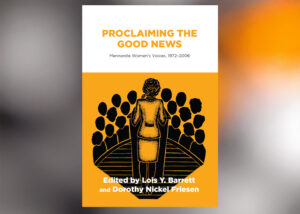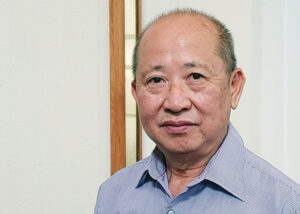Mennonite Church Eastern Canada has terminated a retired pastor’s ministerial credential after investigating him for ministerial misconduct and ministerial sexual misconduct. The regional church made the announcement about Wilmer Martin, 75, of Waterloo, Ont., on June 16.
Martin served pastorates at Tavistock (Ont.) Mennonite Church and Erb Street Mennonite Church in Waterloo from 1968 to 1991 before becoming the president and CEO of Habitat for Humanity Canada from 1991 to 2000. He was then president of TourMagination, a Mennonite-oriented travel company, from 2000 until his retirement in 2016.
The complaints against Martin stem from his tenure at Erb Street Mennonite. According to MC Eastern Canada policy, there is no statute of limitations for ministerial misconduct.
Terminating a credential is the most serious outcome of an investigation and is not something that MC Eastern Canada does lightly, said David Martin, the regional church’s executive minister. “The church is deeply saddened and grieved when it believes that ministerial leaders have caused harm to congregants. Our highest value is on the well-being and safety of people in our congregations.”
Investigation protocol
According to David Martin, MC Eastern Canada began its investigation after receiving a written complaint against Wilmer Martin on Oct. 31, 2019. He wouldn’t specify the nature of the misconduct, citing complainant confidentiality, nor the number of complaints. Official guidelines for Mennonite ministers outline a range of activities that constitute ministerial sexual misconduct, from flirtation to rape.
The regional church followed the procedures outlined in Ministerial Sexual Misconduct Policy and Procedure, the protocol used throughout Mennonite Church Canada and Mennonite Church USA.
As stipulated by the policy, MC Eastern Canada appointed three people to investigate the matter.
Marlene McBride, a professional workplace investigator with more than 25 years of experience as a police officer, led the investigation team. Marianne Mellinger, a former pastor and credentialed therapist, and Steve Manske, a research scientist with significant church council and administrative experience, also served as investigators.
After receiving the investigation report, MC Eastern Canada’s Leadership Council—a seven-person group that oversees the calling, training and credentialling of pastoral leaders—spoke with the investigators and Wilmer Martin.
The council determined that the evidence against Wilmer Martin “was sufficiently compelling and credible to terminate his ministerial credential,” according to an MC Eastern Canada news release.
Wilmer Martin appealed the council’s decision.
A three-person appeal panel reviewed the documentation from the investigation and conducted a hearing, during which they heard from the accused and Leadership Council. Members of this panel were Marvin Friesen, an MC Eastern Canada pastor; Karen Huehn, formerly the clinical director at Shalom Counselling Services in Waterloo; and Elsie Goertzen, coordinator of Mennonite Central Committee B.C.’s End Abuse program.
The panel ruled that the investigation process was valid and upheld the Leadership Council’s judgment.
“I am terribly disappointed in the findings of [MC Eastern Canada],” Wilmer Martin told Canadian Mennonite in an email. “I did not commit ministerial misconduct, sexual or otherwise.
He criticized MC Eastern Canada’s handling of the matter, saying that the regional church did not provide him with details of the allegations, which prevented him from responding with documents or witnesses.
MC Eastern Canada also did not allow Wilmer Martin’s lawyer to be present during his interview. The reason for that, said David Martin, is because the internal church procedure to determine the status of a ministerial credential is not a legal court proceeding.
“The individuals involved in the . . . proceedings reflected a broad range of professional expertise and experience,” David Martin said, “including investigation of workplace harassment complaints, police officer training and experience, professional therapists, ordained clergy, and persons with training and experience in understanding sexual abuse and sexual harassment.”
“[MC Eastern Canada] believes that the investigation, hearings and appeal were conducted fairly and in good faith,” he added.
Other parties respond
- Jen Helmuth, church council chair at Erb Street Mennonite Church, told CM: “Erb Street joins with our wider Mennonite community in holding survivors and others impacted by [the Wilmer Martin] announcement in our prayers; that we may all be open to God’s grace and healing. When allegations or concerns of misconduct are received, they are passed on to [MC Eastern Canada] for response according to their policy and protocols. We have no further comment on their process.”
- Three days after MC Eastern Canada made its announcement, Habitat for Humanity Canada issued a news release, saying the organization is not aware of any allegations or complaints against Wilmer Martin while he was employed there. But it has hired Janice Rubin of Rubin Thomlinson LLP, which has set up a dedicated email address that individuals can use to share confidential information or concerns relating to Wilmer Martin’s time at Habitat for Humanity Canada: HFHreview@rubinthomlinson.com.
- Leadership at Tavistock Mennonite Church declined an interview, saying that the congregation is still processing the news released by MC Eastern Canada.
- Len Rempel, pastor of St. Agatha (Ont.) Mennonite Church, where Wilmer Martin is currently a member and occasionally preaches, declined to comment.
- A spokesperson for TourMagination declined to comment.
- The Waterloo Regional Police Service has not received any reports about Wilmer Martin.
- Canadian Mennonite’s attempts to reach the complainants for comment were unsuccessful.
The impact of ministerial sexual misconduct
Survivors of ministerial sexual misconduct face long-lasting trauma, said Carol Penner, an experienced pastor and an assistant professor of theological studies at Conrad Grebel University College in Waterloo. Although she could not speak about the Wilmer Martin case specifically, Penner—who has written resources for MC Eastern Canada related to healthy boundaries in the church— said in an email, “[Survivors] often lose their trust in authority figures, their trust in the church, their trust in God,” adding, “Healing is measured in decades, not years.”
Surviving sexual abuse is a personal journey that is different for every person, added Barbra Graber, a survivor herself and founder of the Mennonite Abuse Prevention (MAP) List, an archive of documents on Anabaptist church leaders who have been credibly accused of sexual violations. Graber, who lives in Harrisonburg, Va., said, “These incidents can create long-term struggles with sexual dysfunction, depression, lack of self-esteem, inability to trust others, eating disorders [and more], but sometimes people who have experienced it don’t even realize their struggles are connected to the incident they thought was just a thing they could shove out of their minds and be fine.”
Options for survivors
David Martin advises survivors of ministerial misconduct who wish to report the incident to seek the support of a trusted friend or spiritual guide, and with that person’s support, to bring their concern to the regional church—even if they are unsure about whether or not what they experienced was misconduct.
MC Eastern Canada has background materials on its website to help people understand what sexual ministerial misconduct is and how to contact someone if they wish to discuss their experience: mcec.ca/resources/sexual-misconduct.
“My advice to an individual with a concern is to definitely explore it, to be confident that the church will hear your story in good faith and trust, and that you can expect that the exploring of that concern and any potential laying of a complaint is one that will be safe and is one that will be confidential,” David Martin said. “They do not need to expose themselves or fear that they will have to be put on public display.”
But Graber said that survivors who want to report what has happened to them can reach out to a local crisis centre or non-Christian therapist specializing in sexual abuse. She specifies non-Christian, saying, “The Christian ones too often want [survivors] to forgive and ‘find closure.’”
Survivors can also talk to a lawyer, a prosecutor, a civil authority or a survivor network like the MAP List, Survivors Network of those Abused by Priests (SNAP), or Into Account, a Kansas-based organization that provides resources for survivors.
“Someone who can objectively help them think through their personal options and will not try to push them in any one direction is important to find,” Graber said. “I advise never to start with telling someone getting a paycheque from the institutional church, especially if the abuser is from the same community. You may want to return to church people for support, but, if you start there, you will likely not be encouraged to explore all your options.”
“We know that false allegations are rare and multiple false allegations even rarer,” Graber said. “In the case of sexual abuse, especially by clergy. . . the rule should not be, ‘innocent until proven guilty,’ but ‘guilty until proven innocent.’ ”
Canadian Mennonite is investigating allegations that challenge the investigation timing and process. Watch for an upcoming report.










Leave a Reply
You must be logged in to post a comment.